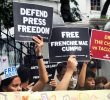By Alan Jazmines
The Comprehensive Agreement on Socio-economic Reforms (CASER) is the main substantive agenda item at hand in the current peace talks between the Government of the Republic of the Philippines (GRP) and the National Democratic Front of the Philippines (NDFP), as the talks proceed to the 5th round in The Netherlands on May 27 to June 2, 2017. Agrarian Reform and Rural Development (ARRD) is the first important part of this agenda item.
Significant progress has been achieved on ARRD in the previous rounds, with an agreement, in principle, for “free land distribution” as the most effective way of rectifying the age-old problem of social justice for the peasantry, the most numerous class and the most oppressed and exploited, together with the working class, in Philippine society.
The NDFP’s top priority in ARRD is for the expropriation and free distribution to the landless peasants of all sullied feudal landholdings in the country. The NDFP is determined to restore the lands to their historically rightful owners: the poor, landless peasants.
Most of these landholdings were actually owned by the descendants of the peasants themselves more than a century ago. But through various foul means, these lands have been unjustly appropriated by the ancestors and descendants of big landgrabbers.
Thus, there is a need to correct the historical injustice perpetrated against the peasantry by returning these lands to the actual tillers and rightful owners.
While significant agreements have been worked out on ARRD, and there are good prospects for other sections on CASER, certain obstacles remain in the progress of the whole peace negotiations.
The GRP has continued to use the remaining more than 400 NDFP-listed political prisoners as bargaining chips for an indefinite ceasefire, even without implementation (or any firm assurance) of basic reforms for the benefit of the people.
The GRP president has even said in his usual frank talk, that he would only release the political prisoners, when there is a final peace agreement. Such a position does not help in creating an atmosphere conducive to the forging of agreements that the GRP president himself wishes for.
Former GRP presidents Corazon Aquino and Fidel Ramos actually released all political prisoners in the spirit of the peace talks during their respective regimes. It appears that, upon the problematic advice of “spoilers” within the AFP, the current president has made a turn around from his earlier promise — of granting amnesty for political prisoners as the most expeditious manner of release and expression of goodwill — as was made before NDFP Peace Panel Chairperson, Fidel Agcaoili.
Another nagging contradiction has been the continued surveillance, and even arrest, of NDFP consultants who are supposed to be protected such by the NDF-GRP Joint Agreement on Safety and Immunity Guarantees (JASIG).
Last February 6, Ariel Arbitrario, an NDFP peace consultant, was rearrested, despite being JASIG-protected and having been an actual participant in the initial rounds of formal talks in Norway in August and December 2016.
Another JASIG-protected NDFP consultant in the field, Ferdinand Castillo, was arrested last February 12 in Caloocan City.
Arbitrario was subsequently released upon the formal protest of the NDFP negotiating panel, but Ferdinand Castillo remains in detention.
The latest case of hostile action against JASIG-protected NDFP consultants has been the arrest of Rommel Salinas, last May 11, in Ozamiz City, Misamis Occidental.
It has also become worrisome for the NDFP that more and more from the state’s military are now being put in top cabinet positions in the government.
The GRP president should assert his authority over the AFP leadership, that has so far played the role of “spoiler” and, in their public statements and actual actions in the field, has even openly contradicted some of his policy positions in promotion of the peace process.
GRP president Duterte can greatly help in moving the peace process forward by taking bold initiatives in the peace negotiations, just as he has been showing positive efforts at pursuing an independent foreign policy.
As it continues to push for the removal of obstacles that have been standing in the way of the peace talks, the NDFP looks forward to making more progress in the process as both sides prepare for the 5th round of formal talks in the coming last week of May to the first week of June.
*About the author: Alan Jazmines is an NDFP Political Consultant and Vice Chairperson, NDFP Reciprocal Working Committee on Socio-Economic Reforms





![[ANALYSIS] A different drug war](https://davaotoday.com/wp-content/uploads/2024/09/1000019103-110x100.png)




